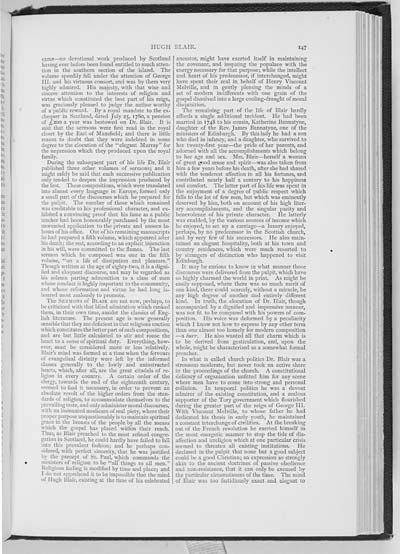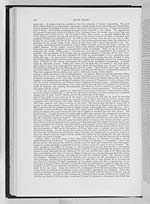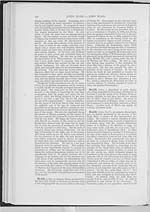147
came�no devotional work produced by Scotland
having ever before been found entitled to much atten-
tion in the southern section of the island. The
volume speedily fell under the attention of George
III. and his virtuous consort, and was by them very
highly admired. His majesty, with that wise and
sincere attention to the interests of religion and
virtue which constituted the best part of his reign,
was graciously pleased to judge the author worthy
of a public reward. By a royal mandate to the ex-
chequer in Scotland, dated July 25, 1780, a pension
of �200 a year was bestowed on Dr. Blair. It is
said that the sermons were first read in the royal
closet by the Earl of Mansfield; and there is little
reason to doubt that they were indebted in some
degree to the elocution of the "elegant Murray" for
the impression which they produced upon the royal
family.
During the subsequent part of his life Dr. Blair
published three other volumes of sermons; and it
might safely be said that each successive publication
only tended to deepen the impression produced by
the first. These compositions, which were translated
into almost every language in Europe, formed only
a small part of the discourses which he prepared for
the pulpit. The number of those which remained
was creditable to his professional character, and ex-
hibited a convincing proof that his fame as a public
teacher had been honourably purchased by the most
unwearied application to the private and unseen la-
bours of his office. Out of his remaining manuscripts
he had prepared a fifth volume, which appeared after
his death; the rest, according to an explicit injunction
in his will, were committed to the flames. The last
sermon which he composed was one in the fifth
volume, "on a life of dissipation and pleasure."
Though written at the age of eighty-two, it is a digni-
fied and eloquent discourse, and may be regarded as
his solemn parting admonition to a class of men
whose conduct is highly important to the community,
and whose reformation and virtue he had long la-
boured most zealously to promote.
The SERMONS of BLAIR are not now, perhaps, to
be criticized with that blind admiration which ranked
them, in their own time, amidst the classics of Eng-
lish literature. The present age is now generally
sensible that they are deficient in that religious unction
which constitutes the better part of such compositions,
and are but little calculated to stir and rouse the
heart to a sense of spiritual duty. Everything, how-
ever, must be considered more or less relatively.
Blair's mind was formed at a time when the fervours
of evangelical divinity were left by the informed
classes generally to the lowly and uninstructed
hearts, which, after all, are the great citadels of re-
ligion in every country. A certain order of the
clergy, towards the end of the eighteenth century,
seemed to find it necessary, in order to prevent an
absolute revolt of the higher orders from the stan-
dards of religion, to accommodate themselves to the
prevailing taste, and only administer moral discourses,
with an insinuated modicum of real piety, where their
proper purpose unquestionably is to maintain spiritual
grace in the breasts of the people by all the means
which the gospel has placed within their reach.
Thus, as Blair preached to the most refined congre-
gation in Scotland, he could hardly have failed to fall
into this prevalent fashion; and he perhaps con-
sidered, with perfect sincerity, that he was justified
by the precept of St. Paul, which commands the
ministers of religion to be "all� things to all men."
Religious feeling is modified by time and place; and
I do not apprehend it to be impossible that the mind
of Hugh Blair, existing at the time of his celebrated
ancestor, might have exerted itself in maintaining
the covenant, and inspiring the populace with the
energy necessary for that purpose; while the intellect
and heart of his predecessor, if interchanged, might
have spent their zeal in behalf of Henry Viscount
Melville, and in gently pleasing the minds of a
set of modern indifferents with one grain of the
gospel dissolved into a large cooling-draught of moral
disquisition.
The remaining part of the life of Blair hardly
affords a single additional incident. He had been
married in 1748 to his cousin, Katherine Bannatyne,
daughter of the Rev. James Bannatyne, one of the
ministers of Edinburgh. By this lady he had a son
who died in infancy, and a daughter, who survived to
her twenty-first year�the pride of her parents, and
adorned with all the accomplishments which belong
to her age and sex. Mrs. Blair�herself a woman
of great good sense and spirit�was also taken from
him a few years before his death, after she had shared
with the tenderest affection in all his fortunes, and
contributed nearly half a century to -his happiness
and comfort. The latter part of his life was spent in
the enjoyment of a degree of public respect which
falls to the lot of few men, but which was eminently
deserved by him, both on account of his high liter-
ary accomplishments, and the singular purity and
benevolence of his private character. He latterly
was enabled, by the various sources of income which
he enjoyed, to set up a carriage�-a luxury enjoyed,
perhaps, by no predecessor in the Scottish church,
and by very few of his successors. He also main-
tained an elegant hospitality, both at his town and
country residences, which were much resorted to
by strangers of distinction who happened to visit
Edinburgh.
It may be curious to know in what manner those
discourses were delivered from the pulpit, which have
so highly charmed the world in print. As might be
easily supposed, where there was so much merit of
one kind, there could scarcely, without a miracle, be
any high degree of another and entirely different
kind. In truth, the elocution of Dr. Blair, though
accompanied by a dignified and impressive manner,
was not fit to be compared with his powers of com-
position. His voice was deformed by a peculiarity
which I know not how to express by any other term
than one almost too homely for modern composition
�a burr. He also wanted all that charm which is
to be derived from gesticulation, and, upon the
whole, might be characterized as a somewhat formal
preacher.
In what is called church politics Dr. Blair was a
strenuous moderate, but never took an active share
in the proceedings of the church. A constitutional
delicacy of organization unfitted him for any scene
where men have to come into strong and personal
collision. In temporal politics he was a devout
admirer of the existing constitution, and a zealous
supporter of the Tory government which flourished
during the greater part of the reign of George III.
With Viscount Melville, to whose father he had
dedicated his thesis in early youth, he maintained
a constant interchange of civilities. At the breaking
out of the French revolution he exerted himself in
the most energetic manner to stop the tide of dis-
affection and irreligion which at one particular crisis
seemed to threaten all existing institutions. He
declared in the pulpit that none but a good subject
could be a good Christian; an expression so strongly
akin to the ancient doctrines of passive obedience
and non-resistance, that it can only be excused by
the particular circumstances of the time. The mind
of Blair was too fastidiously exact and elegant to

![]() Universal Viewer |
Universal Viewer | ![]() Mirador |
Large image | Transcription
Mirador |
Large image | Transcription
![]()

